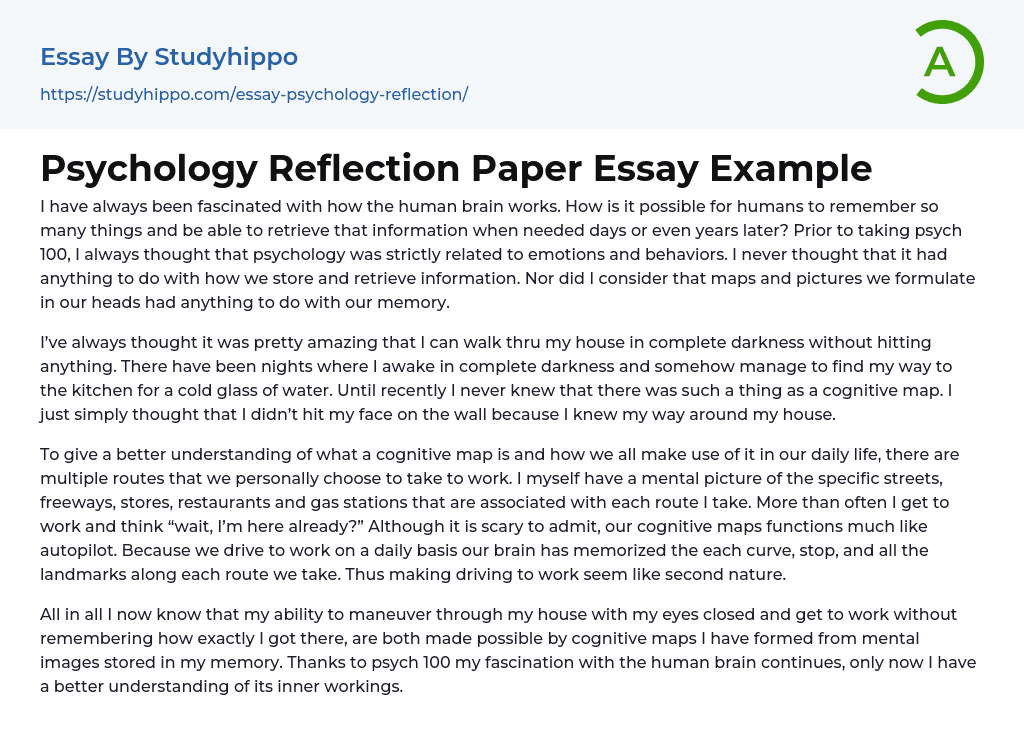I have always been fascinated with how the human brain works. How is it possible for humans to remember so many things and be able to retrieve that information when needed days or even years later? Prior to taking psych 100, I always thought that psychology was strictly related to emotions and behaviors. I never thought that it had anything to do with how we store and retrieve information. Nor did I consider that maps and pictures we formulate in our heads had anything to do with our memory.
I’ve always thought it was pretty amazing that I can walk thru my house in complete darkness without hitting anything. There have been nights where I awake in complete darkness and somehow manage to find my way to the kitchen
...for a cold glass of water. Until recently I never knew that there was such a thing as a cognitive map. I just simply thought that I didn’t hit my face on the wall because I knew my way around my house.
To give a better understanding of what a cognitive map is and how we all make use of it in our daily life, there are multiple routes that we personally choose to take to work. I myself have a mental picture of the specific streets, freeways, stores, restaurants and gas stations that are associated with each route I take. More than often I get to work and think “wait, I’m here already?” Although it is scary to admit, our cognitive maps functions much like autopilot. Because we drive to work on a daily basis our brain has memorized the each
curve, stop, and all the landmarks along each route we take. Thus making driving to work seem like second nature.
All in all I now know that my ability to maneuver through my house with my eyes closed and get to work without remembering how exactly I got there, are both made possible by cognitive maps I have formed from mental images stored in my memory. Thanks to psych 100 my fascination with the human brain continues, only now I have a better understanding of its inner workings.
- Abnormal Psychology essays
- Social Psychology essays
- Developmental Psychology essays
- Jean Piaget essays
- Positive Psychology essays
- Classical Conditioning essays
- Counseling essays
- Psychoanalysis essays
- Educational Psychology essays
- Behaviorism essays
- Authority essays
- Operant Conditioning essays
- Maslow's Hierarchy Of Needs essays
- Mental Health essays
- Personality Psychology essays
- Psychotherapy essays
- Family Therapy essays
- Stanford Prison Experiment essays
- Abraham Maslow essays
- Erik Erikson essays
- Cognitive Psychology essays
- Sigmund Freud essays
- Attachment Theory essays
- Supersize Me essays
- Individual essays
- Infant essays
- Childhood essays
- Adolescence essays
- Growth Mindset essays
- Is Google Making Us Stupid essays
- Childhood Memory essays
- Positive Attitude essays
- Reinforcement essays
- Archetype essays
- Maturity essays
- Deception essays
- Certainty essays
- Conformity essays
- Aggression essays
- Behavior essays
- Human Behavior essays
- Obedience essays
- Adult essays
- Procrastination essays
- Morality essays
- Altruism essays
- Human Sexuality essays
- Role Model essays
- Perseverance essays
- Expressive essays




